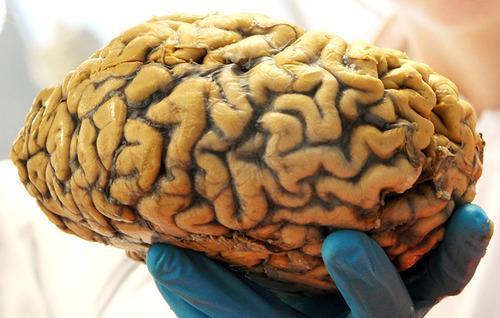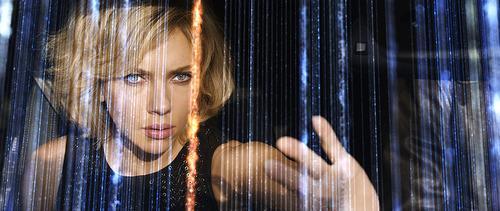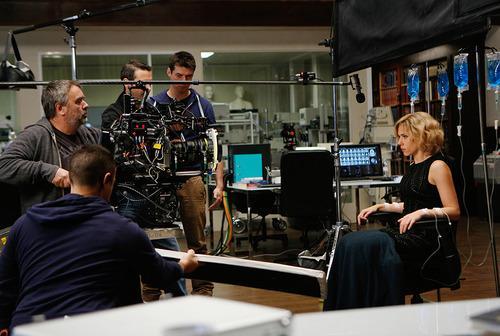
“An action-thriller that examines the possibility of what one human could truly do if she unlocked 100 per cent of her brain capacity and accessed the furthest reaches of her mind.”
So says the official synopsis for ‘Lucy’, the new Luc Besson-directed, Scarlett Johansson-starring movie about an inadvertent drug mule who accidentally ingests a new product which gives her super powers.
Okay, so it’s an action movie, but the conceit of the film bases itself on so-called real science.

“It has long been hypothesized that human beings only use a small percentage of our cerebral capacity at any given time,” continues the plot breakdown.
“For centuries, speculative science has postulated what would occur if mankind could actually evolve past that limit. If each one of the 86 billion densely packed neurons in a human brain fired at once, could that person become, in fact, superhuman?”
Well? Could this actually happen? In the interests of audiences who will ponder this question when ‘Lucy’ is released this weekend, we thought we’d ask someone who actually knows. Professor Alasdair Gibb is an expert in pharmacology and neuroscience and works in the Faculty of Life Sciences at UCL.
“No, not really,” he laughs, admitting that he is a fan of science fiction, before suggesting that there’s actually closer to 100 billion neurons in your noggin. “As it is, the brain burns about 20% of the body’s total energy. If we scaled that up five times, you’d have no energy to do anything else. The brain would be burning so much energy your head would probably overheat. You’d have steam coming out of your ears, metaphorically speaking.”

He continues, “Your brain is like a computer and your computer is limited by the amount of battery power that it’s got. You would run out of glucose quite rapidly. You store glucose in your muscles and liver, so in the longer term, your muscles would atrophy, your kidneys would stop working. Your heart is a muscle, so that would be struggling. The system would break down.”
But what about this oft-quoted idea that we only use 10% of our brain. Is that true?
“It’s about energy again,” says Professor Gibb. “Most of the nerve cells in the brain at any one time are inactive. That’s probably why people say we’re only using 10% of our brain. If they were active, we wouldn’t have any energy to do anything else. Consciously, we can only focus on a few things at any one time. The brain has sophisticated ways of ignoring all the irrelevant input.”
Movie drugs often allow their characters to do superhuman things (see ‘Limitless’, ‘The Bourne Legacy’), but Luc Besson has said that the CPH4 in ‘Lucy’ – while unable to exist as a synthesized substance in large quantities – isn’t entirely made-up.

“This molecule exists and is carried by the woman at six weeks of pregnancy,” the director told Vulture.
Professor Gibb is impressed. “That’s a clever fiction to conflate two different things – development of the nervous system and operation of the nervous system,” he says.
“There are no drugs which have been shown to have any effect like [what happens in the film]. In the late 1980s, a class of drug was circulating and being distributed to college kids in the States, which was a nootropic drug. They were supposed to help them study and pass their exams. But they didn’t do anything like that. Quite possibly they might have been harmful. There are drugs which can give people the perception their mental processes are speeded up and better, like cocaine or PCP. But in fact, an objective measure shows their performance is degraded.”
Nevertheless, there are active areas of research into these kinds of pharmaceuticals. “It’s a crucial aspect of Alzheimer’s research where people lose their cognitive function,” he adds. “There are drugs around called cognitive enhancing drugs. But they don’t enhance people’s ability to process information in the sense of ‘Lucy’. What they’re doing is helping the person to make the best use of what they’ve got already.”
So if you’re going to watch ‘Lucy’, don’t get too excited about the possibility of getting your hands on something that turns you into a superhero. But will Professor Gibb be one of the throng queuing up to watch Scarlett Johansson in action?
“I’m not sure it’s enough to drag me to the cinema,” he laughs. “Maybe if I’m eating my tea at home and there’s nothing else on.”
Ref:yahoo
Ref:yahoo



0 comments:
Post a Comment